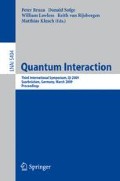Abstract
In this communication, we propose a tentative to set the fundamental problem of measuring process done by a large structure on a microscopic one. We consider the example of voting when an entire society tries to measure globally opinions of all social actors in order to elect a delegate. We present a quantum model to interpret an operational voting system and propose an quantum approach for grading step of Range Voting, developed by M. Balinski and R. Laraki in 2007.
Access this chapter
Tax calculation will be finalised at checkout
Purchases are for personal use only
Preview
Unable to display preview. Download preview PDF.
References
Arrow, K.J.: Social Choice and Individual Values. J. Wiley and Sons, New York (1951)
Balinski, M., Laraki, R.: A theory of measuring, electing and ranking. Proceeding of the National Academy of Sciences of the USA 104(21), 8720–8725 (2007)
Balinski, M., Laraki, R.: Le Jugement Majoritaire : l’Expérience d’Orsay. Commentaire 30(118), 413–420 (summer 2007)
Bitbol, M.: Mécanique quantique, une introduction philosophique. Champs-Flammarion, Paris (1996)
de Borda, J.C.: Mémoire sur les lections au scrutin. In: Histoire de l’Académie Royale des Sciences, Paris (1781)
Bruza, P.D., Kitto, K., Nelson, D., McEvoy, C.L.: Entangling Words and Meaning. In: Proceedings of the Second Quantum Interaction Symposium, pp. 118–124. College Publications, Oxford (2008)
Cohen-Tannoudji, C., Diu, B., Laloë, F.: Mécanique quantique. Hermann, Paris (1977)
de Condorcet, N.: Essai sur l’application de l’analyse à la probabilité des décisions rendues à la pluralié des voix. Imprimerie Royale, Paris (1785)
de Condorcet, N.: Esquisse d’un tableau historique des progrès de l’esprit humain. In: Daunou, P.C.F., de Condorcet, M.L.S. (eds.). Agasse, Paris (1795)
D’Espagnat, B.: Traité de physique et de philosophie. Fayard, Paris (2002)
Dubois, F.: Hypothèse fractaquantique. In: Res-Systemica, 5th European Congress of System Science, Heraklion, vol. 2 (October 2002)
Dubois, F.: On fractaquantum hypothesis. In: Res-Systemica, 6th European Congress of System Science, Paris, vol. 5 (September 2005)
Dubois, F.: Could Nature be quantum at all scales? (preprint) (April 2008)
Dubois, F.: On the measure process between different scales. In: Res-Systemica, 7th European Congress of System Science, Lisboa, vol. 7 (December 2008)
Geanakoplos, J.: Three brief proofs of Arrow’s Impossibility Theorem. Economic Theory 26(1), 211–215 (2005)
Gleason, A.M.: Measures on the Closed Subspaces of a Hilbert Space. Indiana University Mathematics Journal (Journal of Mathematics and Mechanics) 6, 885–893 (1957)
Khrennikov, A.Y., Haven, E.: The importance of probability interference in social science: rationale and experiment (September 2007), arXiv:0709.2802
La Mura, P., Swiatczak, L.: Markovian Entanglement Networks. Leizig Graduate School of Management (2007)
Mandelbrot, B.: The Fractal Geometry of Nature. W. H. Freeman and Co., New York (1982)
Mugur-Schächter, M.: Infra-mécanique quantique. Quantum Physics (January 2008), arXiv:0801.1893
Nottale, L.: La Relativité dans tous ses états: au delà de l’Espace-Temps. Hachette, Paris (1998)
Rivest, R.L., Smith, W.D.: Three Voting Protocols: ThreeBallot, VAV, and Twin. In: Proceedings of the Electronic Voting Technology 2007, Boston, MA, August 6 (2007)
Salem, J.: L’Atomisme antique. Démocrite, Epicure, Lucrèce. Hachette, Paris (1997)
Smith, W.D.: Range Voting satisfies properties that no rank-order system can (April 2007)
Peynaud, E., Blouin, J.: Le goût du vin. Dunod, Paris (2006)
van Rijsbergen, C.J.: The Geometry of Information Retrieval. Cambridge University Press, Cambridge (2004)
Vitiello, G.: My Double Unveiled. In: Advances in Consciousness Research. John Benjamins Publishing Company, Amsterdam (2001)
Wikipedia (2002), http://en.wikipedia.org/wiki/French_presidential_election,_2002
Author information
Authors and Affiliations
Editor information
Editors and Affiliations
Rights and permissions
Copyright information
© 2009 Springer-Verlag Berlin Heidelberg
About this paper
Cite this paper
Dubois, F. (2009). On Voting Process and Quantum Mechanics. In: Bruza, P., Sofge, D., Lawless, W., van Rijsbergen, K., Klusch, M. (eds) Quantum Interaction. QI 2009. Lecture Notes in Computer Science(), vol 5494. Springer, Berlin, Heidelberg. https://doi.org/10.1007/978-3-642-00834-4_17
Download citation
DOI: https://doi.org/10.1007/978-3-642-00834-4_17
Publisher Name: Springer, Berlin, Heidelberg
Print ISBN: 978-3-642-00833-7
Online ISBN: 978-3-642-00834-4
eBook Packages: Computer ScienceComputer Science (R0)

